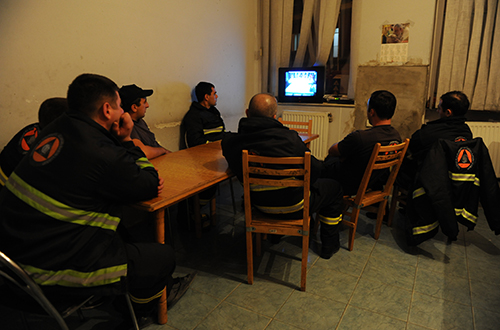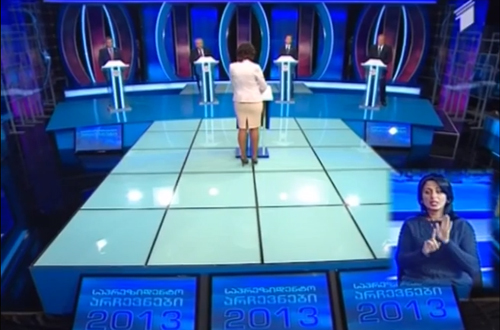
Public TV Hosts Debates of Some Presidential Candidates

Firefighters from Tbilisi’s Saburtalo district fire department unit watch TV debates between the four presidential candidates on October 17. Photo: Eana Korbezashvili/Civil.ge
Georgian Public Broadcaster (GPB) hosted on October 17 debates between four presidential candidates, among them GD’s Giorgi Margvelashvili and UNM’s Davit Bakradze.
But one more visible candidate of this presidential race Nino Burjanadze was absent because the setting under which GPB organized the debates was excluding ex-speaker of parliament from facing Margvelashvili and Bakradze in the live televised debates. She was invited to debate with other group of candidates on October 18.
Burjanadze, whose multiple calls on Margvelashvili to face her in debates were left unheeded, denounced GPB’s event as “quasi-debates” and “staged show”.
Two other presidential candidates, who were involved in GPB’s October 17 debates, were Giorgi Targamadze, leader of the Christian-Democratic Movement (CDM), and a political newcomer Zurab Kharatishvili, ex-chairman of the Central Election Commission.
All four participants were given questions in advance, a day before the debates, so their answers to each of the four questions asked by a moderator were pre-prepared.
Debates became lively when it came to a brief question and answer session between the candidates.
Verbal exchange followed after Targamadze asked Margvelashvili why GD was against of CDM-proposed bill increasing official minimum subsistence level, which is now hovering around GEL 150 per month, to GEL 250.
Margvelashvili responded that a proposal about legislative amendment on increase of subsistence level “is pure populism.”
“What matters is to actually increase pensions and not to play populism with figures,” said Margvelashvili, who was interrupted by Targamadze who said that such a response was itself “populism”.
“Calm down, calm down and let me answer you; the fact that I am at all answering you already means something,” Margvelashvili told Targamadze, who sarcastically thanked GD’s presidential candidate for answering to his questions.
“Give it a rest for a while or I’ll give you a rest,” Margvelashvili responded.
Targamadze’s two other questions asked to Margvelashvili were: what he thought about CDM’s proposal to include a new clause in the constitution saying that marriage can only be the union of a man and a woman and why GD is not imposing “a long-term moratorium” on sale of land to foreign citizens.
On moratorium to sell land to foreign citizens, Margvelashvili said that the Parliament has already suspended sale of agriculture land to foreigners till the end of 2014, pending “thorough study of the issue and pending an eventual decision, which on the one hand should foster business and on the other hand will not harm our national interests.”
On the “definition of family”, Margvelashvili said this issue “is brought out of thin air.”
“Let them clarify this issue who does not know what does the family mean. For me this issue is absolutely clear: family is a joint institution consisting of a man and a woman, where kids grow up. Those who do not understand it, let them continue studying this issue,” Margvelashvili said.
UNM’s Bakradze asked Margvelashvili about GD’s “unfulfilled promises” – one of the main talking points of Bakradze’s campaign. Margvelashvili responded that UNM was trying to make an issue out of nothing. He said that GD came into government with the mandate to deliver with its pre-election promises during a four-year term and the government is fulfilling those pledges gradually.
Kharatishvili asked the question to Bakradze, saying that he wanted to address Margvelashvili, but changed his mind after the GD’s presidential candidate announced he will withdraw from the race in case of runoff. He asked Bakradze what he thought about President Saakashvili’s 2008 decision to give Nino Burjanadze state-owned mansion in Tskneti just for GEL 1. Bakradze responded that the question should be asked to Burjanadze not to him
When it came Margvelashvili’s turn to ask a question to any of his opponents, he said: “I have no questions.”
The issue of Margvelashvili’s announcement that he will pull out from race if not wining the October 27 election in the first round was also raised by Davit Bakradze in his two-minute opening remarks.
Bakradze said that such an approach is kind of a “pressure on voters and an ultimatum.”
“I think it is disrespect of voters,” Bakradze said. “I deem such approach, that if there are no votes more than 50% the actual garnered votes should be disregarded, incorrect in principle.”
Margvelashvili in his opening remarks appealed supporters for high voter turnout.
“If have no strong mandate, we will fail to build new country we are thinking about together,” he told supporters.
In his opening remarks Targamadze, who was trying to criticize both the UNM and GD, said “Bolshevism” was in Georgia under the previous authorities and the same trend continues under the GD’s government.
Zurab Kharatishvili mainly repeated in his opening remarks, which he actually read out, points laid out in his statement in August when announcing about going into politics.

Screengrab from public TV’s debates between the four presidential candidates, accompanied by sign language interpreting.
Foreign Policy
Four questions, shared with participants in advance and asked by a moderator, were on foreign policy, territorial integrity, unemployment problems and how a candidate, if elected, is going to build relations with the government.
On foreign policy, Margvelashvili said that Euro-Atlantic integration is “the major priority.”
“In parallel to this priority we are managing to effectively lower extremely high temperature existing with the Russian Federation,” he said, adding that despite of difficulties the government was able to achieve progress on trade issues with Russia without slowing down process of Euro-Atlantic integration.
Bakradze said that the previous authorities laid foundation for Georgia’s success in the upcoming EU Eastern Partnership summit in Vilnius during which Tbilisi expects to initial Association Agreement with the EU. He said that he is in favor of a dialogue with Russia, but in this process Georgia should not show any “sign of weakness.”
“The current government is sending signs of weakness and hesitation,” Bakradze said. “We cannot afford having inexperienced person as the president.”
Bakradze again mentioned issue of inexperience when speaking on territorial integrity and on erecting of fences by the Russian troops along breakaway South Ossetia’s administrative border.
“This issue triggers a question: who will defend our country’s security after November 17, following the inauguration of new president,” said Bakradze; this possible date of inauguration, mentioned by Bakradze, can only be the case if the October 27 election does not go in the second round. “Can we afford ourselves to give our choice to people, who have no experience in security and foreign affairs?”
Territorial Integrity
On territorial integrity issue, Margvelashvili said Georgia should continue promoting non-recognition policy of “quasi-states” of Abkhazia and South Ossetian.
“Creating conditions for reunification – and not for conquering these territories, should involve… building of such a state where rights, traditions and interests of each citizen will be protected; we will build the state which becomes interesting for Abkhazians and Ossetians,” Margvelashvili said.
Targamadze said Georgia should mount pressure on Russia on the international arena. “We should wait for a confrontation between the West and Russia, which inevitably will result into defeat of Russia; we should be ready for that moment… in order to give strong guarantees to our Abkhazian brothers and tell them that the only guarantee for their survival is within Georgia,” he said.
Kharatishvili said that in respect of Abkhazia and South Ossetia, Georgia has to deal with Russia and “its puppet regimes” in Sokhumi and Tskhinvali. He said there is “actually nationalistic apartheid” in these breakaway regions. He criticized government’s policies in this respect of these regions as “passive.”
Economy
Margvelashvili said, echoing PM Ivanishvili’s remarks, that the first year of GD in power would be “difficult”, there will be “serious breakthrough” in second year and there will be “real results” will be from 2015.
Bakradze said that all the statistical data show that economic situation “is deteriorating on daily basis” starting from October, 2012 when GD came into power.
Kharatishvili said neither the previous nor the current government has an elaborated economic policy and Targamadze mainly focused on CDM’s proposal on the need of increasing official minimum subsistence level and spoke in favor of building small and medium hydro power plants, owned by the state.
Cooperation between President and Govt
On the question of cooperation between the presidency and the government under the new constitution, Bakradze said that, if elected, his major role will be to provide oversight of government’s policy and fulfillment of pledged promises. He said that when UNM was in power, controlling all the branches of government without proper oversight, such system was more fraught with risk of mistakes. “We should take into consideration this past experience and we should today make a choice in favor of having a strong scrutinizer,” he said.
Margvelashvili said that slogans of some of his opponents, like providing oversight of government’s policies or restoring justice, are misleading because “the president simply does not have such constitutional powers.”
“Under the new constitution, president’s function is to provide balance,” he said and added that as a candidate named by the governing coalition, he is better positioned than his opponents to cooperate closely with the government on implementation of its policies.
Kharatishvili said that in his capacity of CEC chairman he was able to have cooperation with all the political forces and will be able to do the same if elected as president.
Targamadze said it is a “lie” when Margvelashvili says in his campaign speeches that political cohabitation will be over with the October 27 presidential election. “Embodiment of ugly cohabitation political system is the Parliament where only two political forces are represented,” he said and added that if elected as president he will use all the available means to hold the early parliamentary elections.
This post is also available in: ქართული Русский